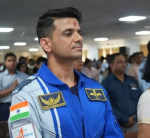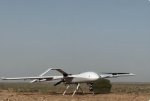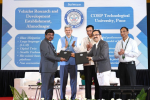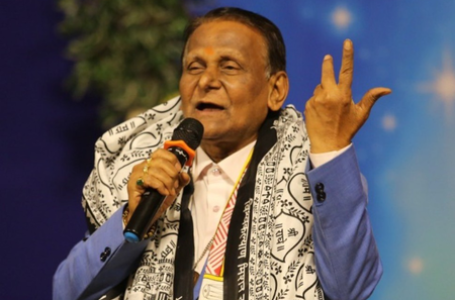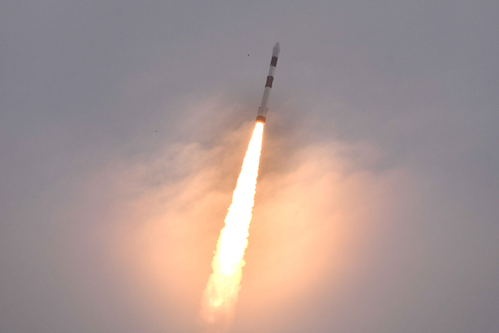
Sriharikota (Andhra Pradesh): India on Sunday morning successfully placed into orbit seven satellites from Singapore- the radar imaging satellite DS-SAR and six others- in a copy book style.
The Indian rocket Polar Satellite Launch Vehicle (PSLV) Core Alone variant did the honours this time.
With this latest rocketing success, the Indian Space Research Organisation (ISRO) has orbited 431 foreign satellites from 36 countries since 1999.
After the launch and orbit placing, Indian Space Research Organisation (ISRO) Chairman S.Somanath said: “The seven satellites have been placed in a perfect orbit. Further exciting action with regard to the final stage of the rocket will soon happen, that is, bringing it down to 300 km to address the space debris issue. The process would take about 1.30 hours. There will be another rocket mission in August or early September.”
The 44.4 metre tall PSLV Core Alone variant rocket – coded named PSLV-C56 – with a lift off mass of 228.6 ton, blasted off from the first launch pad at the Satish Dhawan Space Centre (SDSC) here at 6.30 a.m. slowly rose up towards the skies.
The rocket carried the 352 kg synthetic aperture radar satellite DS-SAR as the primary passenger and six other small satellites as piggybacks blasted off from the first launch pad at Satish Dhawan Space Centre (SDSC) here at 6.30 a.m.
The other six satellites are – 23 kg VELOX-AM, ARCADE (24 kg), SCOOB-II-4kg from Nanyang Technological University, Singapore; the 3 kg NuLIoN belonging to NuSpace Pte Ltd, Singapore, the 3.5 kg Galassia-2 from National University of Singapore and the 13 kg ORB-12 STRIDER from Aliena Pte. Ltd., Singapore.
Cumulatively, the seven satellites weighed 422.5 kg.
The rocketing on Sunday was made possible by NewSpace India Ltd – the commercial arm of India’s Department of Space – by contracting primarily with ST-Engineering to orbit the DS-SAR satellite.
One of the notable features of the mission is ISRO deorbiting or bringing down the rocket’s fourth stage to low earth orbit (LEO) with the remaining fuel in order to cut short its orbital life.
The PSLV rocket is powered by solid (first and third stages) and liquid (second and fourth stages) fuels alternatively.
The PSLV in normal configuration is a four stage/engine expendable rocket powered by solid and liquid fuels alternatively with booster motors strapped on to the first stage to give higher thrust during the initial flight moments.
The rocket that flew on Sunday was the Core Alone variant – without any strap-on motors – as the total weight of the satellites was low.
Just over 21 minutes into its flight, the PSLV-C56 ejected DS-SAR satellite. It was followed by other six satellites.
In about 24 minutes after the lift off, the Indian rocket orbited all the seven satellites.
The DS-SAR satellite is developed under a partnership between DSTA (representing the government of Singapore) and ST Engineering.
Once deployed and operational, it will be used to support the satellite imagery requirements of various agencies within the government of Singapore.
ST Engineering will use it for multi-modal and higher responsiveness imagery and geospatial services for their commercial customers.
DS-SAR carries a Synthetic Aperture Radar (SAR) payload developed by Israel Aerospace Industries (IAI). This allows the DS-SAR to provide for all-weather day and night coverage, and capable of imaging at one metre resolution at full polarimetry.
On the other hand, the VELOX-AM, is a technology demonstration microsatellite; ARCADE Atmospheric Coupling and Dynamics Explorer (ARCADE) is an experimental satellite; SCOOB-II, a 3U nanosatellite flying a technology demonstrator payload: NuLIoN by NuSpace, an advanced 3U nanosatellite enabling seamless IoT connectivity in both urban & remote locations; Galassia-2, a 3U nanosatellite that will be orbiting at low earth orbit and ORB-12 STRIDER satellite is developed under an International collaboration, ISRO said.
The Sunday rocketing was the second one for ISRO in a space of about two weeks. On July 14, ISRO rocket LVM3 put into orbit the Chandrayaan-3 spacecraft.
The Indian space agency has lined up a series of rocket missions for 2023.
The next one planned in the mission to Sun. ISRO will be sending up its Aditya L1, a coronagraphy satellite, on a PSLV rocket to study the solar atmosphere towards the end of August.
According to ISRO, the spacecraft will be placed into a halo orbit around the first Lagrange point, L1, of the Sun-Earth system.
The satellite around the L1 point has the major advantage of continuously viewing the Sun without occultation/eclipses.
The Aditya L1 mission is slated to happen a couple of days after ISRO attempts to land on the lunar soil its lander that is being carried by the Chandrayaan-3 spacecraft.
After that, will be the orbiting of Anwesha satellite and XPoSAT- a X-Ray Polarimeter Satellite.
It will be the country’s dedicated polarimetry mission to study the dynamics of bright astronomical X-ray sources in extreme conditions, the government said.
The launch of the Radar Imaging Satellite- RISAT-1B aboard the PSLV rocket is planned during 2023.
The Indian space agency with its Geosynchronous Satellite Launch Vehicle (GSLV) plans to orbit INSAT-3DS and two IDRSS (Indian Data Relay Satellite System) satellites.
These rocketing missions apart, ISRO will be testing the various systems that will go into its LVM3 rocket for the maiden human space mission.
IANS






